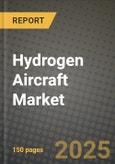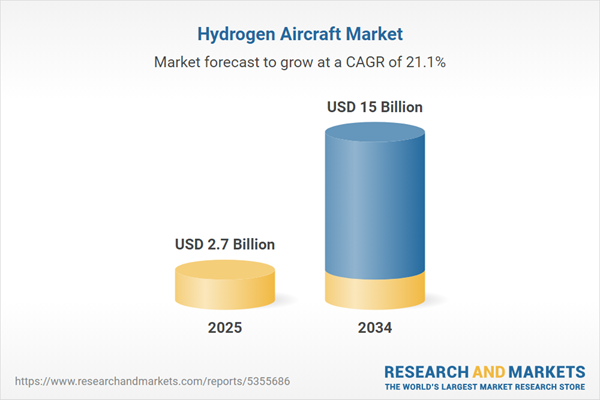The Hydrogen Aircraft Market represents a groundbreaking shift in the aerospace industry’s approach to sustainable aviation. Hydrogen-powered aircraft offer a viable alternative to traditional jet fuel, producing zero CO2 emissions when burned in a fuel cell and significantly reducing the sector’s environmental footprint. With growing pressure to meet net-zero targets, both established manufacturers and start-ups are racing to develop hydrogen propulsion systems that balance performance, efficiency, and cost. Key innovations include hydrogen fuel cells, hydrogen combustion engines, and advanced storage solutions for cryogenic hydrogen.
While commercial adoption is still in its early stages, several promising prototypes and demonstrator flights have validated the technology’s potential. Government initiatives, corporate commitments to sustainability, and rising consumer awareness of eco-friendly travel options are collectively driving the development of hydrogen aircraft. Although infrastructure and cost challenges remain, the Hydrogen Aircraft Market is well-positioned to play a crucial role in the aviation industry’s journey toward a more sustainable future.
In 2024, the Hydrogen Aircraft Market gained significant momentum as governments, industry players, and research institutions ramped up investments and development efforts. Several major aerospace companies announced plans to accelerate hydrogen-powered aircraft programs, unveiling prototype designs and demonstrating hydrogen-powered flights on regional and smaller commercial aircraft.
The year saw increased collaboration across the aerospace value chain, with hydrogen fuel suppliers, airport operators, and aircraft manufacturers joining forces to address supply chain challenges and infrastructure gaps. Regulatory bodies began laying the groundwork for certification standards and safety protocols specific to hydrogen propulsion systems.
Additionally, governments introduced new incentives and funding opportunities to promote hydrogen technology, further encouraging innovation and public-private partnerships. Public perception also improved as airlines and aircraft makers highlighted the environmental benefits of hydrogen-powered flight, sparking greater interest from both consumers and investors. By year-end, several hydrogen propulsion concepts had reached advanced testing phases, paving the way for more widespread commercialization in the near future.
Looking ahead to 2025 and beyond, the Hydrogen Aircraft Market is poised for substantial growth, underpinned by technological advancements, increased production capacity, and expanding regulatory support. Key industry players are expected to roll out small-scale commercial hydrogen-powered aircraft, targeting regional routes as initial markets. Infrastructure investments, including hydrogen refueling stations at key airports, will become more widespread, enhancing the feasibility of hydrogen-powered operations. Collaboration between aerospace companies and energy providers will continue to improve the efficiency of hydrogen production and storage solutions.
As the market matures, cost reductions in hydrogen fuel cells and cryogenic tanks will help bridge the affordability gap compared to traditional jet fuel. Environmental, social, and governance (ESG) commitments will also play a larger role, prompting airlines to include hydrogen aircraft in their long-term fleet strategies. With these developments, hydrogen aircraft are set to gradually transition from experimental prototypes to commercially viable options, reshaping the future of aviation and reinforcing the industry’s commitment to sustainable growth.
Key Insights Hydrogen Aircraft Market
- Increasing investments in hydrogen propulsion technologies by major aerospace manufacturers and startups.
- Growing interest in green hydrogen production to ensure a sustainable fuel supply chain for hydrogen-powered aircraft.
- Emergence of modular hydrogen storage solutions designed to improve refueling efficiency and simplify infrastructure requirements.
- Introduction of regional hydrogen-powered aircraft as early adopters, showcasing the feasibility of short-haul, emission-free flights.
- Enhanced regulatory frameworks and certifications tailored to hydrogen aircraft, accelerating commercialization timelines.
- Increasing pressure from global aviation emissions regulations and net-zero commitments to find sustainable fuel alternatives.
- Rapid advancements in hydrogen fuel cell efficiency and lightweight storage technologies, improving aircraft range and performance.
- Government incentives and funding programs aimed at advancing hydrogen-powered aviation innovation and commercialization.
- Growing consumer awareness and demand for greener travel options, encouraging airlines to adopt hydrogen aircraft.
- High infrastructure costs and the need for widespread hydrogen refueling networks at major airports remain significant barriers to large-scale adoption.
Hydrogen Aircraft Market Segmentation
By Technology- Fully Hydrogen Powered Aircraft
- Hybrid Electric Aircraft
- Hydrogen Fuel Cell Aircraft
- Liquid Hydrogen Aircraft
- Hydrogen Combustion
- Hydrogen Fuel Cell
- 20 Km To 100 Km
- More Than 100 Km
- Up To 20 Km
- Air Taxis
- Business Jets
- Unmanned Aerial Vehicles
- North America (USA, Canada, Mexico)
- Europe (Germany, UK, France, Spain, Italy, Rest of Europe)
- Asia-Pacific (China, India, Japan, Australia, Vietnam, Rest of APAC)
- The Middle East and Africa (Middle East, Africa)
- South and Central America (Brazil, Argentina, Rest of SCA.
Hydrogen Aircraft Market Analytics
The research analyses various direct and indirect forces that can impact the Hydrogen Aircraft market supply and demand conditions. The parent market, derived market, intermediaries’ market are analyzed to evaluate the full supply chain and possible alternatives and substitutes. Geopolitical analysis, demographic analysis, and Porter’s five forces analysis are prudently assessed to estimate the best Hydrogen Aircraft market projections.Recent deals and developments are considered for their potential impact on Hydrogen Aircraft's future business. Other metrics analyzed include Threat of New Entrants, Threat of Substitutes, Degree of Competition, Number of Suppliers, Distribution Channel, Capital Needed, Entry Barriers, Govt. Regulations, Beneficial Alternative, and Cost of Substitute in Hydrogen Aircraft Market.
Hydrogen Aircraft trade and price analysis helps comprehend Hydrogen Aircraft's international market scenario with top exporters/suppliers and top importers/customer information. The data and analysis assist our clients in planning procurement, identifying potential vendors/clients to associate with, understanding Hydrogen Aircraft price trends and patterns, and exploring new Hydrogen Aircraft sales channels. The research will be updated to the latest month to include the impact of the latest developments such as the Russia-Ukraine war on the Hydrogen Aircraft market.
Hydrogen Aircraft Market Competitive Intelligence
The proprietary company revenue and product analysis model unveils the Hydrogen Aircraft market structure and competitive landscape. Company profiles of key players with a business description, product portfolio, SWOT analysis, Financial Analysis, and key strategies are covered in the report. It identifies top-performing Hydrogen Aircraft products in global and regional markets. New Product Launches, Investment & Funding updates, Mergers & Acquisitions, Collaboration & Partnership, Awards and Agreements, Expansion, and other developments give our clients the Hydrogen Aircraft market update to stay ahead of the competition.Company offerings in different segments across Asia-Pacific, Europe, Middle East, Africa, and South and Central America are presented to better understand the company strategy for the Hydrogen Aircraft market. The competition analysis enables the user to assess competitor strategies and helps align their capabilities and resources for future growth prospects to improve their market share.
Your Takeaways From this Report
- Global Hydrogen Aircraft market size and growth projections (CAGR), 2024 - 2034
- Impact of recent changes in geopolitical, economic, and trade policies on the demand and supply chain of Hydrogen Aircraft.
- Hydrogen Aircraft market size, share, and outlook across 5 regions and 27 countries, 2024 - 2034.
- Hydrogen Aircraft market size, CAGR, and Market Share of key products, applications, and end-user verticals, 2024 - 2034.
- Short and long-term Hydrogen Aircraft market trends, drivers, restraints, and opportunities.
- Porter’s Five Forces analysis, Technological developments in the Hydrogen Aircraft market, Hydrogen Aircraft supply chain analysis.
- Hydrogen Aircraft trade analysis, Hydrogen Aircraft market price analysis, Hydrogen Aircraft Value Chain Analysis.
- Profiles of 5 leading companies in the industry- overview, key strategies, financials, and products.
- Latest Hydrogen Aircraft market news and developments.
Region-level intelligence includes
- North America Hydrogen Aircraft Market Size, Share, Growth Trends, CAGR Forecast to 2034
- Europe Hydrogen Aircraft Market Size, Share, Growth Trends, CAGR Outlook to 2034
- Asia-Pacific Hydrogen Aircraft Industry Data, Market Size, Competition, Opportunities, CAGR Forecast to 2034
- The Middle East and Africa Hydrogen Aircraft Industry Data, Market Size, Competition, Opportunities, CAGR Forecast to 2034
- South and Central America Hydrogen Aircraft IndustryIndustry Data, Market Size, Competition, Opportunities, CAGR Forecast to 2034
The report will be updated to the latest month and delivered in 3 working days
This product will be delivered within 1-3 business days.
Table of Contents
Companies Mentioned
- Syngenta AG
- Biolchim S.P.A.
- FMC Corporation
- Haifa Group
- UPL Limited
- Bayer AG
- Sikko Industries Ltd.
- Humintech GmbH
- Promisol
- Novihum Technologies GmbH
- Borregaard
- Qingdao Future Group
- Bioline
- Humic Growth Solutions
- Actagro LLC
- Rovensa S.A.
- Tagrow
- Cifo S.P.A.
- Loveland Industries Inc.
- Eastman Chemical Company
- OMEX Agricultural Holdings Limited
- LALLEMAND Inc.
- Agrinos AS
- Brandt Consolidated Inc.
- Koppert Biological Systems B.V.
- Valagro S.p.A.
- Marrone Bio Innovations Inc.
- Novozymes A/S
- Biovert S.L.
- Black Earth Humic LP
- Nutri-Tech Solutions Pty. Ltd.
- Biostadt India Limited
- Bioiberica S.A.U.
- Fertiplus International BV
- BioAtlantis Ltd.
Table Information
| Report Attribute | Details |
|---|---|
| No. of Pages | 150 |
| Published | August 2025 |
| Forecast Period | 2025 - 2034 |
| Estimated Market Value in 2025 | 2.7 Billion |
| Forecasted Market Value by 2034 | 15 Billion |
| Compound Annual Growth Rate | 21.1% |
| Regions Covered | Global |
| No. of Companies Mentioned | 35 |









